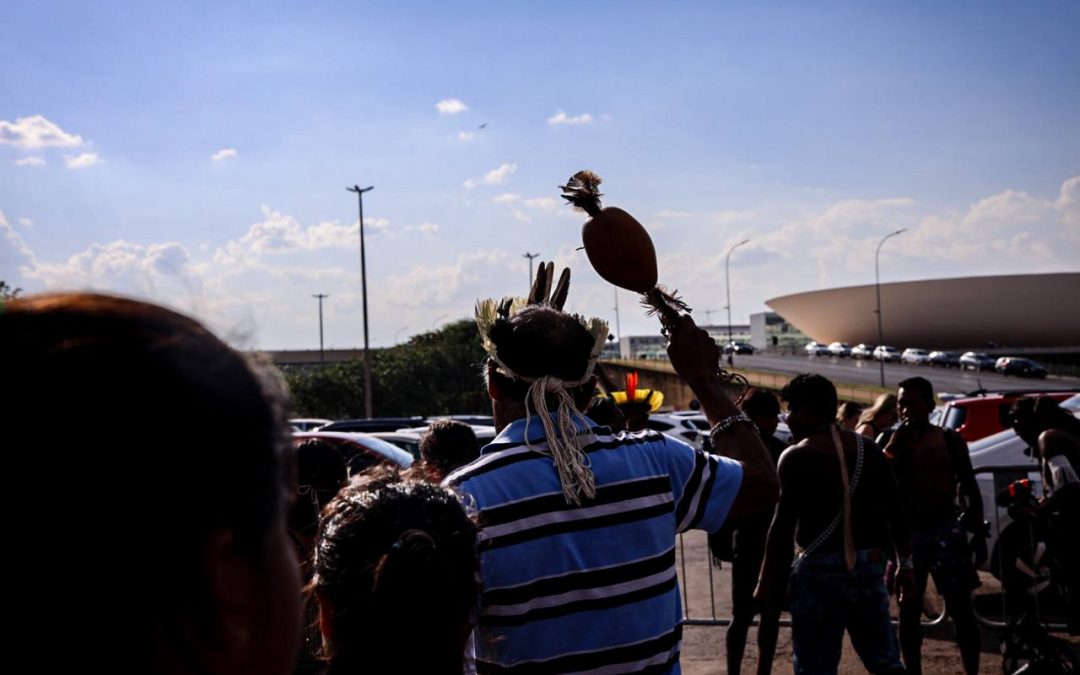Foto: Tukumã Pataxó
Once again, the Senate is trying to trample on the rights of indigenous peoples by putting Bill 2903 on the agenda, which attempts to turn the Time Frame thesis into law and seeks to legalize crimes against indigenous people. The Senate’s Constitution and Justice Committee (CCJ) will vote on the bill this Wednesday (27), starting at 10am (Brasília time), which has been named by the Articulation of Indigenous Peoples of Brazil (Apib) as the Genocide Bill.
The bill will be considered on the same day that the Supreme Federal Court (STF) resumes the Time Frame trial, scheduled to start at 2pm. The Justices will debate the proposals on compensation, mining and the exchange of Indigenous Lands that have arisen in the sessions throughout the trial.
In a historic session last Thursday (21/09), the STF formed a majority of votes to overturn the thesis sponsored by agribusiness in the judiciary. With a 9-2 vote against the Time Frame, the Court formed a majority and sealed an important victory in the fight for indigenous peoples’ rights, but the proposals presented by Justices Alexandre de Moraes and Dias Toffoli will only be discussed on Wednesday, the 27th. Find out how the STF voted here.
In the Senate, the vote was scheduled for September 20, but the session was marked by a lack of dialog: indigenous leaders were prevented from entering the room and the CCJ rejected the request for a public hearing. After a collective request by the senators, the vote was also postponed until September 27.
For Apib, the Senate’s decision is an affront to the Supreme Court, the indigenous movement and democracy. “The Time Frame was overturned in the Supreme Court, but the struggle continues. The ruralist caucus in the Senate is putting its economic interests ahead of indigenous lives and trying to approve bill 2903 before the Supreme Court’s trial on the Time Frame is finalized,” says Kleber Karipuna, Apib’s executive coordinator.
In addition, after the Time Frame was overturned in the Supreme Court, Senator Dr. Hiran (PP-RR) filed, on September 22, a proposal to amend the Constitution (PEC) calling for the establishment of the Time Frame thesis. Named PEC 048/2023, the amendment seeks to change the 1988 Federal Constitution, which provides for the original right of indigenous peoples over traditionally occupied lands.
“The Supreme Court buried the Time Frame thesis and the Senate is trying to resurrect it with this PEC 48. It’s a move that affronts the Federal Constitution and Brazil’s democracy. The ruralists are trying to turn rights into a tug-of-war with the Supreme Court in an attempt to show who has more power. We will continue to reinforce that rights cannot be negotiated and that indigenous lives cannot continue to be massacred by the economic and political interests of anyone,” said Dinamam Tuxá, Apib’s executive coordinator.
Apib points out that the Senate’s attitudes are the result of Brazilian politicians’ direct links to the invasion of indigenous lands, as shown in the dossier “The invaders” by the journalistic website “Keeping an eye on the ruralists” (De Olho nos Ruralistas). According to the study, representatives of the National Congress and the Executive have around 96,000 hectares of land overlapping with indigenous lands. In addition, many of them were financed by ranchers who invaded indigenous lands, who donated R$3.6 million to the election campaigns of agribusiness congressmen . This group of invaders funded 29 political campaigns in 2022, totaling R$5,313,843.44 (USD 1.061.198,45). Of this total, R$1,163,385.00 (USD 232,444.56) went to the losing candidate, Jair Bolsonaro (PL).
Understand the Bill 2903
On August 23, the Senate Committee on Agriculture and Agrarian Reform (CRA) approved the text, which is now being analyzed by the CCJ. In addition to the Time Frame, Bill 2903 (formerly Bill 490) has other setbacks for the rights of indigenous peoples, points out Apib’s legal department.
According to the legal department, the bill proposes the construction of highways and hydroelectric dams in indigenous territories without free, prior and informed consultation with the affected communities and wants to allow farmers to sign production contracts with indigenous people, which violates the right of indigenous peoples to the exclusive usufruct of demarcated territories.
The Bill also authorizes anyone to question the demarcation process, including indigenous lands that have already been recognized, and favours land grabbing, as it recognizes land titles that are under areas of traditional occupation. It also resurrects the regime of guardianship and assimilationism, standards overcome by the 1988 Constitution, which deny the identity of indigenous people and makes the indigenist policy of non-contact with peoples in voluntary isolation more flexible, as well as reformulating constitutional concepts such as traditional occupation, original rights and exclusive usufruct.
Find out more about the thesis that could define the future of indigenous peoples in the booklet and on the website: https://apiboficial.org/marco-temporal/
About Apib
The Articulation of Indigenous Peoples of Brazil (Apib) is a national reference body for the indigenous movement in Brazil, created from the bottom up. It brings together seven regional indigenous organizations (Apoinme, ArpinSudeste, ArpinSul, Aty Guasu, Terena Council, Coaib and Guarani Yvyrupa Commission) and was born with the aim of strengthening the unity of our peoples, the articulation between the different regions and indigenous organizations in the country, as well as mobilizing indigenous peoples and organizations against threats and attacks on indigenous rights.
CONTACT
E-mail: [email protected]

